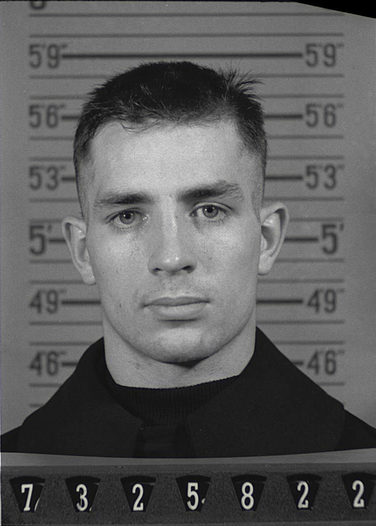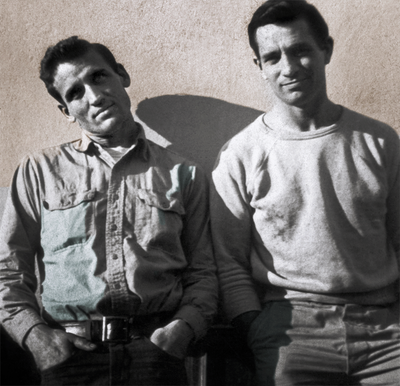Spirituality in the writing of Jack Kerouac
“It changed my life like it changed everyone else’s.”
As a precocious 14 year old, I idolised Bob Dylan, so this Dylan quote on the back of Jack Kerouac’s novel On the Road was what made me snap it up in my early teens. My computer broke shortly after this purchase and, absent my usual dead-end wandering through forums and flash videos, I decided to wander through the hazy streets of mid-20th century America, devouring Kerouac’s book in a couple of sittings.

Kerouac’s fast paced prose had me rambling through the book with the same momentum as its famed protagonists, Sal and Dean, my pulse pounding and my soul singing in imitation of the low grade amphetamine effect that both made the book possible and that it induced in its readers. It was sex, drugs and freeform jazz; everything a counterculturally minded teen could want. Most importantly, the novel had a haunting sense of longing for something higher, questing for some great beauty to be admired or some mission to be fulfilled, which is intoxicating to any young person. But the Jack Kerouac I would come to know, as I wandered onto the roads less travelled – his other novels and novellas and his short works – was a vastly more complex person than the one found between the pages of his most well known work. Throughout his life, Kerouac would journey from coining the term “Beat Generation” to deriding the 60s counterculture as degenerate, from Catholicism to Buddhism and back again, and from a happy childhood in small town Massachusetts to an ignominious death choking on streams of his own blood. Through it all his spiritual quest was constant and, even as he glorified sex, drugs and Eastern mysticism, he still maintained: “All I write about is Jesus”.
Kerouac’s childhood was a relatively happy one. He was raised in a French-Canadian household in Lowell, Massachusetts. Kerouac adored his mother, who instilled her devout Catholicism in her children, a faith which would remain with Kerouac, no matter how transmuted or transformed, for his whole life. One of the most fascinating influences this early period had on the spiritual perspective of Kerouac and his literature centres around his older brother, Gerard. Gerard Kerouac died at the age of nine from rheumatic fever, but Kerouac immortalises his brother in his 1963 novel Visions of Gerard. Kerouac presents him as a loving and devout figure who teaches the young Jack much about piety and spirituality. Kerouac was profoundly affected by Gerard’s deathbed vision of the Virgin Mary watching over him as it gave Jack a conception of spirituality that was intimate and beautiful in a way that coursed through the visionary and revelatory aspects of his prose.
Although Catholicism was his boyhood faith, in his adult life, he took up the ideas of Buddhism and other Eastern philosophies and spiritual systems with all the zeal of a new convert. These ideas and phrases bleed into his prose and he speaks regularly of enlightened “Bodhisattvas” seeing through the illusion of material reality and reaching higher levels of inspiration and consciousness. The voluminous syllables of Sanskrit do much to enhance the already sacred aura around Kerouac’s prose. The Dharma Bums (1958) is the work of Kerouac’s which most represents his enthusiasm for the ideas of Buddhism. It describes his search for enlightenment and awareness through Zen methods, as well as through enthusiastic sessions of wine drinking and poetry slams. Kerouac can sometimes come off a little like a Hare Krishna trying to force a copy of the Bhagavadgita on you, constantly spouting off Sanskrit in big, ranting tirades, but this zeal gives even greater life to Kerouac’s fiery, Pentecostal prose, as well as communicating the earnestness of his spiritual quest.

Kerouac returned to the foundation of his spiritual life in later years: Catholicism. Reverence for Judeo-Christian imagery and ideas were hewn into the shining stone of Kerouac’s soul and he reconnected with these ideas in works such as Lonesome Traveler and Desolation Angels. Towards the end of the semi-autobiographical Desolation Angels, he describes a scene of devotion and peace in a Mexican church, and it becomes clear that Kerouac’s return to Christianity is, in part, a gesture of love for his mother, whom he admires in prayer. As his life went on Kerouac became more and more devout, regularly attending church and saying the rosary. However, as Kerouac became more devout, he also became more conservative, with the progenitor of the hippies and a free love enthusiast appearing on the television show of William F. Buckley Jr (practically the pope of American conservativism at the time) to deride the youth culture of the 1960s.
Jack Kerouac was, without a doubt, a very complex man. Spirituality was always an important part of his identity and much of his work gained its power from the way in which it addressed the quest for spiritual satisfaction. Although Kerouac drew freely from many sources, creating something of a spiritual smorgasbord for himself, he would consistently return to his religious appetizer: Catholicism. He drew links between the mystical tradition of Catholicism and Zen Buddhism in a profoundly new and fascinating way that would be echoed by his contemporary Thomas Merton, a Catholic monk who fostered a relationship between Catholic monasteries and Buddhist temples. Although Kerouac is often portrayed as a free-wheeling, free-loving spirit in the mould of the hippies who would grow out of his example, internally he was often tortured and unsure of his beliefs and convictions, even those which he took to with passion and which set his prose on fire. It is precisely this complexity which makes Kerouac’s journey such a profound and relatable one. As Kerouac turned a life of tragedy and debauchery into prose that shone with the sacred energy of the Holy Spirit and Nirvana, his work proved that old Christian adage: that even if you’re on the gallows or in the gutter, “God meets you where you are”.
Featured images via:
huffingtonpost.com
wikipedia.com
eltornillodeklausfiles.wordpress.com

